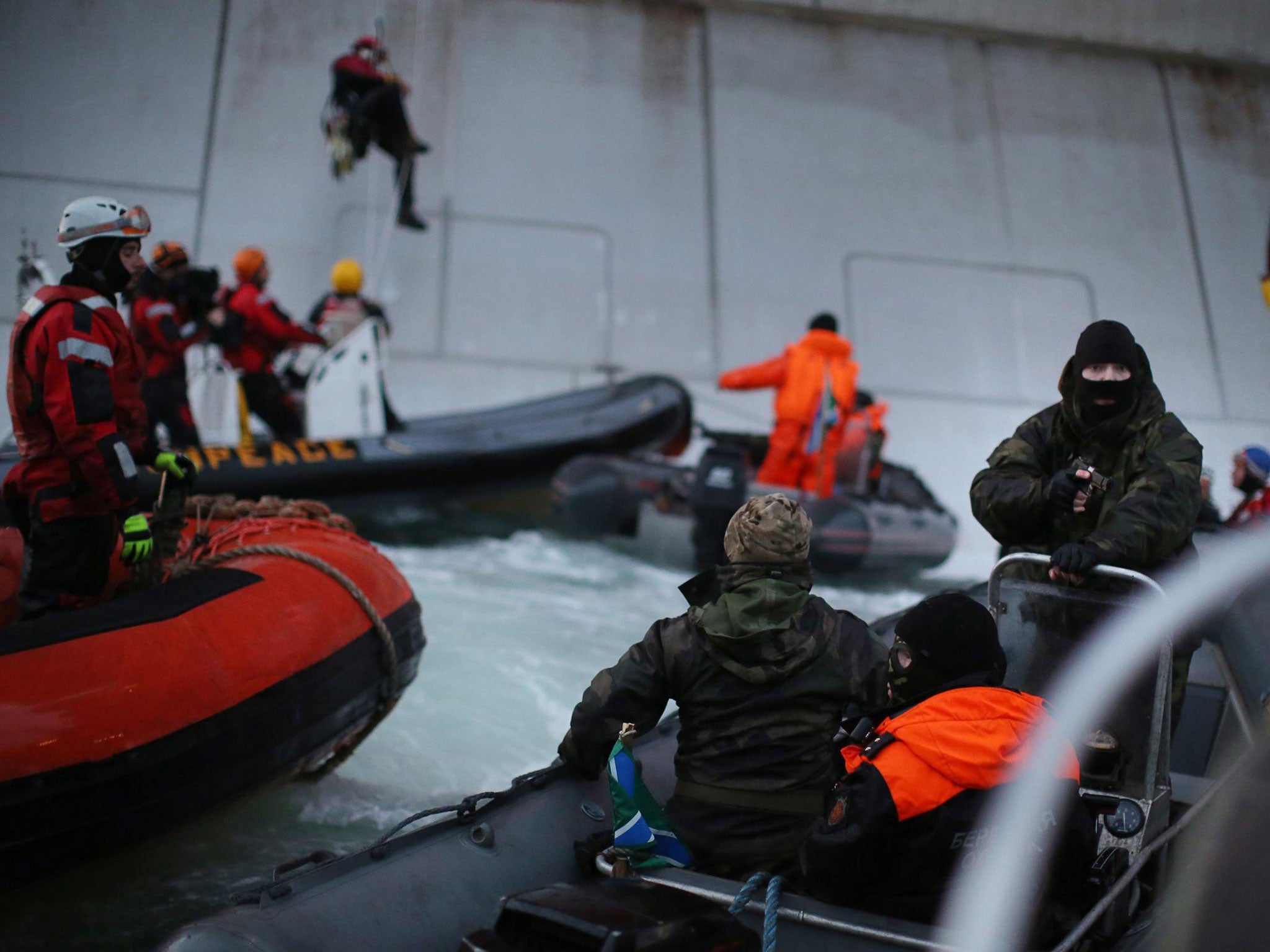Russia arrests 30 environmental activists during Arctic protest
Protesters aboard ‘Arctic Sunrise’, including six Britons, could face terrorism charges

Your support helps us to tell the story
From reproductive rights to climate change to Big Tech, The Independent is on the ground when the story is developing. Whether it's investigating the financials of Elon Musk's pro-Trump PAC or producing our latest documentary, 'The A Word', which shines a light on the American women fighting for reproductive rights, we know how important it is to parse out the facts from the messaging.
At such a critical moment in US history, we need reporters on the ground. Your donation allows us to keep sending journalists to speak to both sides of the story.
The Independent is trusted by Americans across the entire political spectrum. And unlike many other quality news outlets, we choose not to lock Americans out of our reporting and analysis with paywalls. We believe quality journalism should be available to everyone, paid for by those who can afford it.
Your support makes all the difference.International pressure is mounting on Russia to free 30 environmentalists, including six Britons, who were detained by officers armed with guns and knives when their ship was seized following a protest over oil drilling in the Arctic.
Activists described how they were punched and kicked by security forces as they were made to kneel on the deck at gunpoint when masked coastguards abseiled on to the Greenpeace vessel from a helicopter.
The ship, the Arctic Sunrise, is now being towed towards the Russian port of Murmansk, three days sail away, where it was reported that those on board could be charged with terrorism offences potentially carrying a jail sentence of up to 10 years.
Protests were held at Russian embassies around the world including in London whilst social media campaigns demanded the multi-national crew of the Dutch-registered vessel be allowed to go free.
The Russians claimed that a survival pod – a multi-coloured foam tube – used in the protest over the Russian state oil giant Gazprom’s platform in the Pechora Sea looked like a bomb. The suggestion was dismissed by Greenpeace as “ludicrous”.
Faiza Oulahsen, who was on board the ship, described how 15 armed men wearing balaclavas had boarded the Arctic Sunrise on Thursday, herding the 29 crew into one compartment whilst the captain was detained separately on the bridge. Officers seized computers and data devices in a search of the ship.
“They used violence against some of us, they were hitting people, kicking people down, pushing people,” Ms Oulahsen said.
Eleven warning shots were fired over the bow of the vessel before boarding. The Russian coastguard is part of the Federal Security Service, which succeeded the KGB following the dissolution of the Soviet Union.
Ben Ayliffe, head of Greenpeace International's Arctic oil campaign, said the protest had been peaceful and the vessel was within its rights to be in the waters which - although part of the Russian economic zone - are open to international shipping.
"In our last phone call with the ship, the crew said that their spirits remain high and they have been boosted by messages of support from thousands of people who stand with them to oppose dangerous Arctic oil drilling,” he said.
On Wednesday two protesters were arrested after scaling the Prirazlomnaya platform - the world’s first permanent, ice-resistant oil rig. It is due to begin production next year.
Russian coastguard rammed the protesters’ inflatables and fired guns and water cannon in a bid to stop the direct action.
Environmentalists are demanding a halt to the exploitation of the Arctic shelf, which is home to around 30 per cent of the world’s undiscovered gas and 13 per cent of the oil.
Apart from promoting reliance on fossil fuels which cause global warming, it is feared that a major oil spill would create an environmental catastrophe in the world’s most remote and pristine region.
President Putin however is determined to press ahead with further exploration. The Russian Foreign Ministry said: “The intruders' actions were of aggressive and provocative character and had the outward signs of extremist activity that can lead to people's deaths and other grave consequences.”
A number of major oil companies, including Shell, have plans to begin drilling in the Arctic soon after signing deals with the Russian state energy companies which hold the licences to the region.
A Foreign Office spokeswoman said that the British nationals on board would be offered consular assistance once they reached land.
Join our commenting forum
Join thought-provoking conversations, follow other Independent readers and see their replies
Comments